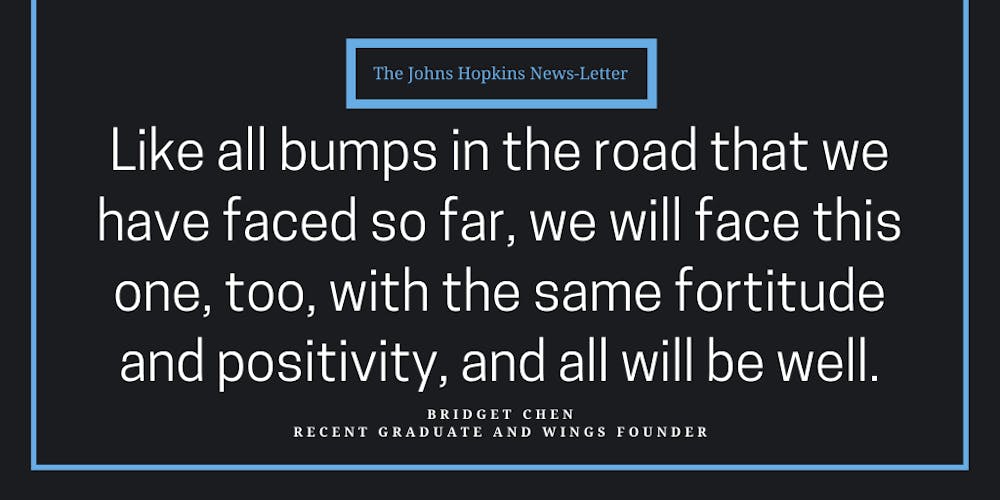Following the cancellation of in-person classes through the rest of the semester as a result of the coronavirus (COVID-19) pandemic, student organizations have been forced to adapt their processes. Members of these student groups spoke with The News-Letter to explain how they have handled the pandemic.
Sophomore Kylie Sharron, external training director for A Place to Talk (APTT), a peer listening group on campus, explained that the move to remote learning has severed the essential face-to-face interaction aspect of the organization.
“We are working diligently to figure out a means to continue to connect with the student body throughout the chaos of the rest of this semester,” Sharron said.
Another organization that faces similar problems with transitioning to a virtual platform is the Sexual Assault Resource Unit (SARU), a student-run advocacy group that supports survivors of sexual violence.
SARU Co-Director Reah Vasilakopoulos, a senior, stated the in-person space that SARU aims to provide is essential.
“We try to provide a physical space for survivors and their allies to congregate in,“ she said. “Not having that has been a little challenging. I think that is something that we are very used to having. So it’s forced us to think more creatively and be more on top of virtual communication methods.”
Vasilakopoulos noted that the group also normally holds workshops for Greek organizations.
“Workshops had to be put on hold because it’s difficult to facilitate an interactive and culture-changing workshop over a virtual space,” Vasilakopoulos said.
SARU Co-Director Deeya Bhattacharya, a senior, explained that the organization had planned events for April, which is Sexual Assault Awareness Month. These have had to be placed on hold.
Bhattacharya expressed her disappointment at not being able to be on campus to promote this month, which will result in a lack of visibility. Vasilakopoulos agreed.
“Something that we’re trying to balance is the very natural disappointment that comes with... all of our plans being put on hold, while also understanding that things are happening in the way they need to happen right now to keep everyone safe and healthy,” Vasilakopoulos said.
Despite their disappointment of having to delay plans, both Bhattacharya and Vasilakopoulos expressed hope in moving to an online platform.
Bhattacharya explained that SARU discussed hosting a virtual Sex Week in collaboration with the Student Government Association (SGA), to include meditation workshops, open discussions and dance workshops.
“Creating a space where people can continue bonding with each other and have people to talk to and [have] more distinctively supportive interaction can be helpful,” Vasilakopoulos said.
Wings, a student group aimed at promoting menstrual health and hygiene on campus and in the greater Baltimore community, had their Menstrual Products Initiative (MPI) pilot program cut short.
The program installed free tampon and pad dispensers in a number of all gender and women’s restrooms this February.
Bridget Chen, a recent graduate and Wings founder, explained that while she was saddened at the shortening of the initiative, the data collected in the five weeks will be sufficient for presentation to the administration.
Chen explained that Wings aims to present the data to administrative stakeholders to expand MPI.
“Like all bumps in the road that we have faced so far, we will face this one, too, with the same fortitude and positivity, and all will be well,” Chen wrote.
For many performing arts student organizations, members expressed disappointment in having their performances cancelled.
Senior Adrianna Boen, co-president of dance group Eclectics, stated that members are devastated at the cancellation of their annual Spring Showcase. Since Eclectics performs in a different showcase in the fall semester, members are unable to perform the choreography they have practiced for half a semester.
“Our members put a lot of work into the showcase so to have all their efforts thus far go to waste is difficult,” Boen said.
Junior Becky Shade, a member of Witness Theater, expressed a similar sentiment.
“We are all extremely disappointed not to be working together to create the art we had been so excited about this semester,” she said.
Shade explained that while Witness’ spring showcase has been cancelled, they plan to feature these plays during the fall semester.
Both Shade and Boen stated that the groups will continue to have executive board elections that they have transitioned from in-person to a virtual platform.
In addition to the complications COVID-19 posed to event schedules and initiatives, students also expressed the difficulties of being suddenly removed from their peer groups.
“My understanding of the necessity of remote learning doesn’t lessen the pain and disappointment of having to say such early goodbyes to my APTT family this semester,” Sharron said.
Boen felt similarly.
“Our group is truly a family,” Boen said. “Not being able to perform one last time with people that mean a lot to them has been heartbreaking.”
Nevertheless, Bhattacharya stressed that SARU’s 24/7 peer-run hotline remains open to students, which provides crisis support and resource connection.
Shade also underscored the importance of self-care during this time.
“Right now, the most effective things we can all do is to try our best to take care of our own physical and mental health and to act, speak and listen with open minds and empathetic hearts,” she said.
To contact SARU’s Peer Hotline, call (410)-516-7887.





